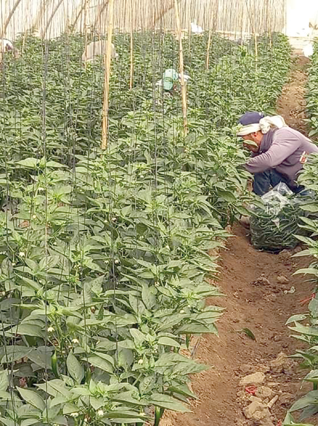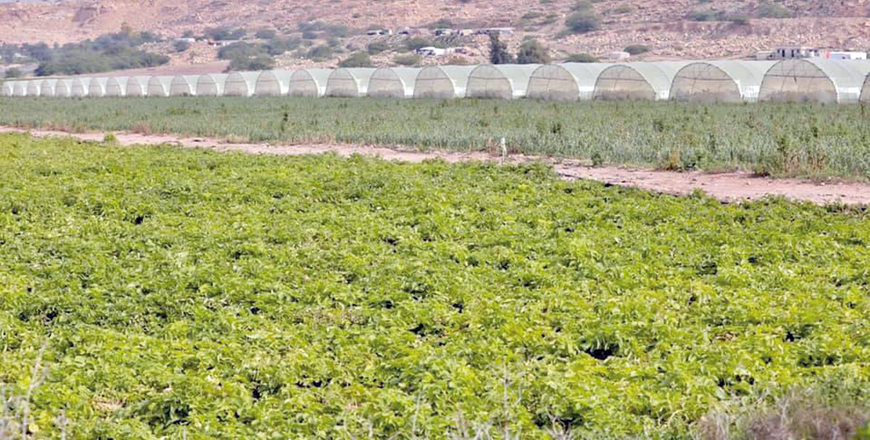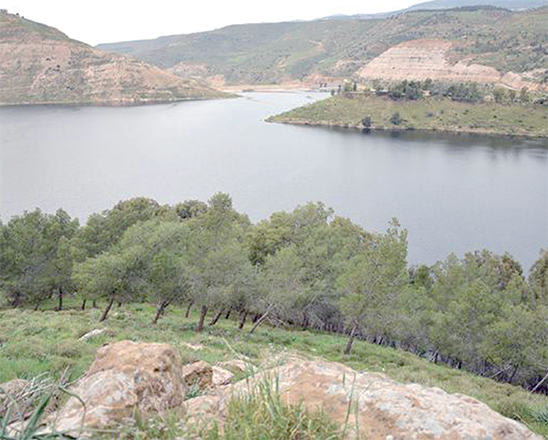You are here
Long-awaited rainfall brings relief to Jordan’s farmers
By Mays Ibrahim Mustafa - Nov 29,2022 - Last updated at Nov 29,2022

A farmer is seen tending to his green chili plants at a farm in the Jordan Valley in this recent photo (Photo courtesy of Ahmad Sabha)
AMMAN — Farmers are welcoming the late arrival of rain which has affected most regions across the Kingdom, during the past few days.
President of the Jordanian Farmers Union Mahmoud Oran noted that “the significant amount of rainfall” received during these past few days “boosted” delayed farming activities in various agricultural areas across the Kingdom.
“It has encouraged many farmers in Madaba and the Jordan Valley to resume their work after they had postponed cultivating their crops due to the delayed rainfall,” he told The Jordan Times.
Moreover, it relieved farmers from the numerous challenges and financial burdens they were forced to bear due to “the dry weather and the frequent heat waves affecting Jordan”, he added.
Rain generally reduces the number of ill-causing insects and agricultural pests attacking crops, which decreases farmer’s use of pesticides. It also washes off dust and pollutants covering plants and helps the soil release micronutrients that are essential to plant growth, Oran continued.
Ahmad Sabha, a vegetable farmer in the Jordan Valley, said that his use of pesticides decreases by 40 to 50 per cent during the rainy season.
“We use insecticides all year long, but in significantly fewer amounts during winter when we increase our use of fungicides, as most fungi that attack plants are able to withstand extremely cold weather unlike insects,” he told The Jordan Times.
Sabha, who is currently cultivating eggplants and bell peppers in greenhouses, said that roughly 85 per cent of farmers in the Jordan Valley are currently growing cucumbers and tomatoes, which are the most consumed crops in Jordan.
“The majority of vegetables entering the market are from the Jordan Valley, as the agricultural season in the Shafa area in Ajloun ends in November,” he added.
Marwan Abu Sido, who owns 120 dunums of citrus trees and 15 dunums of wheat in the Shafa area, expressed hope that this rainfall will lead to a “bountiful” season.
The water deficit conditions, which farmers dealt with during this past year, reduced fruit growth and led to a pre-harvest fruit drop, he told The Jordan Times.
Oran also noted that rainfall is a “key driver” of pasture growth, which many farmers rely on to sustain their livestock, especially with the rising cost of fodder.
Aside from increasing farmer’s production costs, reliance on dry fodder negatively impacts milk production in cattle, he added.
Rain also motivates the growth of various therapeutic plants, such as wormwoods, germanders and thymes, which act as antibiotics, increasing the immunity of animals and protecting them from various diseases during winter, which in turn relieves farmers from expensive medical bills, he continued.
The Agriculture Ministry’s Spokesperson Lawrence Majali noted that the ministry has taken multiple “proactive steps” throughout the year to prepare for the wet season and increase rainwater harvesting.
As part of its plan to enhance water harvesting and reduce Jordan’s vulnerability to the impacts of climate change, the ministry has established around 63 hafirs and provided local farmers with grants to establish over 5,000 wells during the year 2022, he told The Jordan Times.
Related Articles
AMMAN — Rising temperatures, combined with the late arrival of rain, are impacting farmers’ crop yields and are causing a significant increa
AMMAN — The Waleh Dam, built in 2003 with a storage capacity of 9 million cubic metres, is now dry due to the decrease in precipitation and
AMMAN — With the total capacity of the dams reaching 32 per cent, experts are hopeful for a revitalised agricultural season. Omar Salam

















